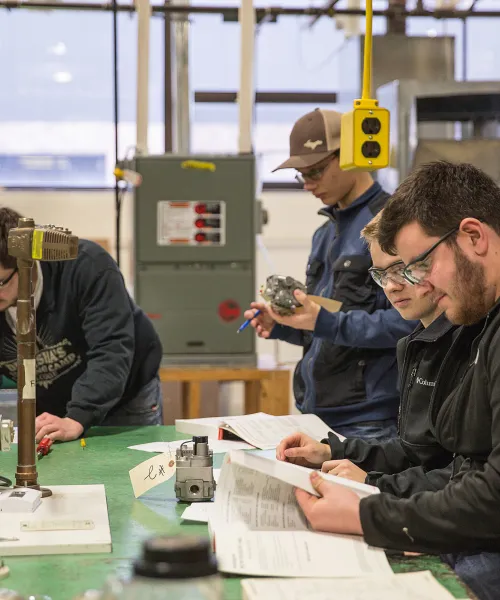What It's All About
As a student in the HVACR technology program, you will gain the skills needed to begin a career in residential and light commercial applications. Students in this program work with both residential and light commercial heating, ventilation, ducting, air conditioning, and refrigeration equipment. Students will also learn how to test electrical circuits, or components for continuity, using electrical test equipment.
This extensive background, together with hands-on skills in sheet metal layout and fabrication, HVACR equipment installation and repair qualifies graduates to enter one of the worlds' fastest-growing industries.
Job Outlook
Median Earnings
$23/hr.
Projected Job Growth
to 2029
+5% (National)
+14% (Michigan)
Earnings, job growth and education levels noted are from the U.S. Bureau of Labor Statistics (National), and CareerOneStop/U.S. Department of Labor (Michigan).
What does a career in HVACR look like?
Depending upon graduate interest, job opportunities in HVACR exist in a wide array of settings including installing, maintaining and repairing heating, ventilation, cooling, and refrigeration units for both commercial and residential customers. Professionals may also diagnose and repair the electronic, mechanical, and electrical components of these systems.
Technicians will also have the opportunity to travel to job sites in service areas and work with dispatch to ensure schedules are maintained and delays are properly communicated to customers. Technicians may also work in a large facility such as a shopping center, factory, transportation warehouse, hospital, grocery store, or university to maintain heating and cooling systems to meet specific needs.

Programs
Climate Control Technology
Associate of Applied Science
As a student enrolled in the climate control associate degree program, you will complete the same technical courses as the HVACR certificate program. You will also complete liberal studies courses, which will further prepare you for employment as a service technician and can increase the opportunity to advance in your career. Graduates of the associate degree program can more seamlessly continue their education through a wide variety of bachelor's degree programs.
Heating, Ventilation, Air Conditioning and Refrigeration (HVACR)
Certificate
The HVACR technology certificate program prepares graduates for employment as professionals in the heating, ventilation, air conditioning and refrigeration (HVACR) industry. As an HVACR technician, you will become a specialist who creates comfortable, healthy and energy-efficient indoor environments for the storage of food and medicine, and for transportation, warehouses, factories and many other essential services. The climate control program also provides you instruction in both technical theory and practical application.
Heating, Ventilation, Air Conditioning and Refrigeration (HVACR)
Minor
Choosing a minor in HVACR can provide valuable supplemental knowledge and skills that complement a major degree program. A minor in HVACR offers a focused understanding of heating, air-conditioning, ventilation, and refrigeration systems, which are essential components in many industries. It equips students with practical expertise in system design, installation, maintenance, and troubleshooting, preparing them for careers in energy management, sustainable building design, facility management, or even entrepreneurship in the HVACR field.
Contact Information
The Technology and Occupational Sciences office is at Northern Michigan University's Jacobetti Complex, Room 105.
Phone: 906-227-2190
Email: tos@nmu.edu
